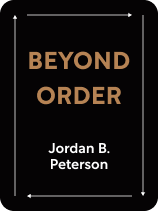

This article is an excerpt from the Shortform book guide to "Beyond Order" by Jordan Peterson. Shortform has the world's best summaries and analyses of books you should be reading.
Like this article? Sign up for a free trial here.
Where does life’s meaning come from? What does your conscience tell you to do? Do you listen?
In Beyond Order: 12 More Rules for Life, Jordan B. Peterson lays out his philosophy and rules for living a life of excellence in a world of hardship and chaos. Beyond Order Rule 4 is this: Notice that opportunity lurks where responsibility has been abdicated.
Read more to learn why assuming personal responsibility for your life will bring you meaning and fulfillment.
Beyond Order: Rule 4
With Beyond Order Rule 4, Peterson urges you to notice that opportunity lurks where responsibility has been abdicated. To set the stage, he argues that meaning in life doesn’t come from happiness, as is commonly believed. That’s because happiness feels good for only a moment or two—and having previously felt good doesn’t help much when life gets tough. In the midst of a dark, difficult experience, that earlier happiness will be just a memory.
(Shortform note: Consider also the hedonic treadmill, a concept from psychology that states that people’s happiness levels tend to revert to a default level. This happens because, over time, we get used to things that temporarily increase or decrease our happiness, such as getting a new phone or ending a relationship. Pursuing happiness, then, functions a bit like a treadmill—you’ll always be running in place.)
Instead, Peterson says, you can find lasting strength and meaning in a life of responsibility. Taking responsibility for your life will make you strong, committed, and capable—traits that help you find meaning and fulfillment. For instance, you might find that taking responsibility for your bad habits helps you to overcome them, grow more disciplined, and feel better about yourself. Think of taking responsibility as an exercise: The more you practice being responsible, the stronger you’ll become.
(Shortform note: In Courage Is Calling, Ryan Holiday relates personal responsibility to courage, which he defines as doing the right thing in spite of your fear. Holiday suggests that even when you’re trying to be responsible, you might make mistakes—and when that happens, courage means being accountable for those mistakes. Thus, responsibility involves some courage: You can’t know exactly what will happen when you start to take on the burdens of your life, but you must do so even if you’re afraid.)
Expanding Your Responsibilities
Once you can handle the weight of your work, relationships, and daily life, Peterson recommends that you take on additional responsibilities. Many people, he says, leave important tasks unattended (at work and at home) or do them poorly. If you take on these missed opportunities, you’ll grow even stronger while also improving your reputation and gaining opportunities to advance in life and work. For instance, your company might announce a time-sensitive project that any employee in good standing can apply to take on. Plenty of your coworkers might pass it up, but you could jump on the opportunity and, in doing so, demonstrate your competence and readiness to work.
(Shortform note: While Peterson gives advice for individual success, businesses that have many tasks left undone might want to think more broadly about accountability within their team. The Harvard Business Review advises that it’s best not to aggressively confront teammates who aren’t accountable, as blame typically leads to arguments. Instead, clarify your perspective on the issue first, and then speak from curiosity rather than stress. Try to understand why someone is missing deadlines or leaving things undone, and look to help rather than blame. After understanding the other person’s perspective, make a plan of action to get them back on track.)
You can find the work that needs doing by listening to your conscience. Your conscience is the voice within you that speaks up when you do something bad versus something good. According to Peterson, you can rely on it as an unerring judge of the quality of your actions—of whether you’ve acted in accord with your highest good. Thus, your conscience is an inner instinct for ethical behavior.
(Shortform note: Peterson presents the conscience as an unerring moral guide—however, conscience may not point to any absolute moral truth. Consider that people on both sides of an issue, such as abortion, can conscientiously object to the other side—a doctor can conscientiously object to performing the procedure, and a women’s rights advocate can conscientiously object to anti-abortion laws. Each person’s conscience bears more on their relative sense of morality than any absolute sense (which some argue doesn’t exist at all). The takeaway: Use your conscience as a guide to what’s right relative to your life, but don’t take it as a guide to universally moral or correct behavior.)

———End of Preview———
Like what you just read? Read the rest of the world's best book summary and analysis of Jordan Peterson's "Beyond Order" at Shortform.
Here's what you'll find in our full Beyond Order summary:
- A no-nonsense guide to navigating the chaos of our difficult world
- How and why you should listen to your conscience
- How to show up for life as fully as you can






